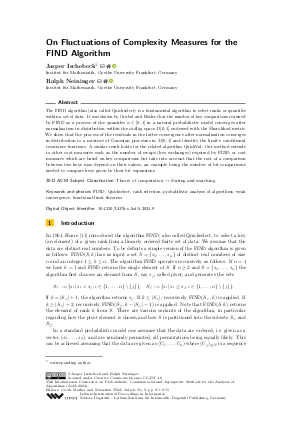On Fluctuations of Complexity Measures for the FIND Algorithm
Authors
Jasper Ischebeck  ,
Ralph Neininger
,
Ralph Neininger 
-
Part of:
Volume:
35th International Conference on Probabilistic, Combinatorial and Asymptotic Methods for the Analysis of Algorithms (AofA 2024)
Part of: Series: Leibniz International Proceedings in Informatics (LIPIcs)
Part of: Conference: International Conference on Probabilistic, Combinatorial and Asymptotic Methods for the Analysis of Algorithms (AofA) - License:
 Creative Commons Attribution 4.0 International license
Creative Commons Attribution 4.0 International license
- Publication Date: 2024-07-18
File

PDF
LIPIcs.AofA.2024.9.pdf
- Filesize: 0.74 MB
- 15 pages
Document Identifiers
Subject Classification
ACM Subject Classification
- Theory of computation → Sorting and searching
Keywords
- FIND
- Quickselect
- rank selection
- probabilistic analysis of algorithms
- weak convergence
- functional limit theorem
Metrics
- Access Statistics
-
Total Accesses (updated on a weekly basis)
0PDF Downloads0Metadata Views
Abstract
The FIND algorithm (also called Quickselect) is a fundamental algorithm to select ranks or quantiles within a set of data. It was shown by Grübel and Rösler that the number of key comparisons required by FIND as a process of the quantiles α ∈ [0,1] in a natural probabilistic model converges after normalization in distribution within the càdlàg space D[0,1] endowed with the Skorokhod metric. We show that the process of the residuals in the latter convergence after normalization converges in distribution to a mixture of Gaussian processes in D[0,1] and identify the limit’s conditional covariance functions. A similar result holds for the related algorithm QuickVal. Our method extends to other cost measures such as the number of swaps (key exchanges) required by FIND or cost measures which are based on key comparisons but take into account that the cost of a comparison between two keys may depend on their values, an example being the number of bit comparisons needed to compare keys given by their bit expansions.
Cite As Get BibTex
Jasper Ischebeck and Ralph Neininger. On Fluctuations of Complexity Measures for the FIND Algorithm. In 35th International Conference on Probabilistic, Combinatorial and Asymptotic Methods for the Analysis of Algorithms (AofA 2024). Leibniz International Proceedings in Informatics (LIPIcs), Volume 302, pp. 9:1-9:15, Schloss Dagstuhl – Leibniz-Zentrum für Informatik (2024)
https://doi.org/10.4230/LIPIcs.AofA.2024.9
BibTex
@InProceedings{ischebeck_et_al:LIPIcs.AofA.2024.9,
author = {Ischebeck, Jasper and Neininger, Ralph},
title = {{On Fluctuations of Complexity Measures for the FIND Algorithm}},
booktitle = {35th International Conference on Probabilistic, Combinatorial and Asymptotic Methods for the Analysis of Algorithms (AofA 2024)},
pages = {9:1--9:15},
series = {Leibniz International Proceedings in Informatics (LIPIcs)},
ISBN = {978-3-95977-329-4},
ISSN = {1868-8969},
year = {2024},
volume = {302},
editor = {Mailler, C\'{e}cile and Wild, Sebastian},
publisher = {Schloss Dagstuhl -- Leibniz-Zentrum f{\"u}r Informatik},
address = {Dagstuhl, Germany},
URL = {https://drops.dagstuhl.de/entities/document/10.4230/LIPIcs.AofA.2024.9},
URN = {urn:nbn:de:0030-drops-204440},
doi = {10.4230/LIPIcs.AofA.2024.9},
annote = {Keywords: FIND, Quickselect, rank selection, probabilistic analysis of algorithms, weak convergence, functional limit theorem}
}
Author Details
References
- Jon Bentley. Programming pearls. Addison-Wesley, Reading, Mass. URL: https://www.pearson.de/programming-pearls-9780134498027.
- Patrick Billingsley. Convergence of probability measures. Wiley Series in Probability and Statistics: Probability and Statistics. John Wiley & Sons Inc., New York, 1999. A Wiley-Interscience Publication. URL: https://doi.org/10.1002/9780470316962.
-
Thomas H. Cormen, Charles E. Leiserson, Ronald L. Rivest, and Clifford Stein. Introduction to algorithms. MIT Press, Cambridge, MA, third edition, 2009.

- Luc Devroye. A note on the height of binary search trees. J. ACM, 33(3):489-498, May 1986. URL: https://doi.org/10.1145/5925.5930.
- James Allen Fill. Distributional convergence for the number of symbol comparisons used by QuickSort. Ann. Appl. Probab., 23(3):1129-1147, 2013. URL: https://doi.org/10.1214/12-AAP866.
- James Allen Fill and Svante Janson. The number of bit comparisons used by Quicksort: an average-case analysis. Electron. J. Probab., 17:no. 43, 22, 2012. URL: https://doi.org/10.1214/EJP.v17-1812.
- James Allen Fill and Jason Matterer. QuickSelect tree process convergence, with an application to distributional convergence for the number of symbol comparisons used by worst-case find. Combin. Probab. Comput., 23(5):805-828, 2014. URL: https://doi.org/10.1017/S0963548314000121.
- James Allen Fill and Takehiko Nakama. Distributional convergence for the number of symbol comparisons used by quickselect. Advances in Applied Probability, 45(2):425-450, 2013. URL: https://doi.org/10.1239/aap/1370870125.
- Rudolf Grübel and Uwe Rösler. Asymptotic distribution theory for Hoare’s selection algorithm. Adv. in Appl. Probab., 28(1):252-269, 1996. URL: https://doi.org/10.2307/1427920.
- C. A. R. Hoare. Algorithm 63: Partition. Commun. ACM, 4(7):321, July 1961. URL: https://doi.org/10.1145/366622.366642.
- C. A. R. Hoare. Algorithm 65: Find. Commun. ACM, 4(7):321-322, July 1961. URL: https://doi.org/10.1145/366622.366647.
- Jasper Ischebeck and Ralph Neininger. On fluctuations of complexity measures for the find algorithm, 2024. URL: https://arxiv.org/abs/2403.07685.
- Kevin Leckey, Ralph Neininger, and Henning Sulzbach. Process convergence for the complexity of radix selection on markov sources. Stochastic Processes and their Applications, 129(2):507-538, 2019. URL: https://doi.org/10.1016/j.spa.2018.03.009.
- Hosam M. Mahmoud. Distributional analysis of swaps in quick select. Theoretical Computer Science, 411(16):1763-1769, 2010. URL: https://doi.org/10.1016/j.tcs.2010.01.029.
-
Jason Matterer. Quickselect Process and QuickVal Residual Convergence. PhD thesis, The Johns Hopkins University, Baltimore, Maryland, 2015.

- Colin McDiarmid. Concentration. In Michel Habib, Colin McDiarmid, Jorge Ramirez-Alfonsin, and Bruce Reed, editors, Probabilistic Methods for Algorithmic Discrete Mathematics, pages 195-248. Springer Berlin Heidelberg, Berlin, Heidelberg, 1998. URL: https://doi.org/10.1007/978-3-662-12788-9_6.
- Bruce Reed. The height of a random binary search tree. J. ACM, 50(3):306-332, May 2003. URL: https://doi.org/10.1145/765568.765571.
- Henning Sulzbach, Ralph Neininger, and Michael Drmota. A Gaussian limit process for optimal FIND algorithms. Electronic Journal of Probability, 19(none):1-28, 2014. URL: https://doi.org/10.1214/EJP.v19-2933.
- Brigitte Vallée, Julien Clément, James Allen Fill, and Philippe Flajolet. The number of symbol comparisons in QuickSort and QuickSelect. In Automata, languages and programming. Part I, volume 5555 of Lecture Notes in Comput. Sci., pages 750-763. Springer, Berlin, 2009. URL: https://doi.org/10.1007/978-3-642-02927-1_62.
